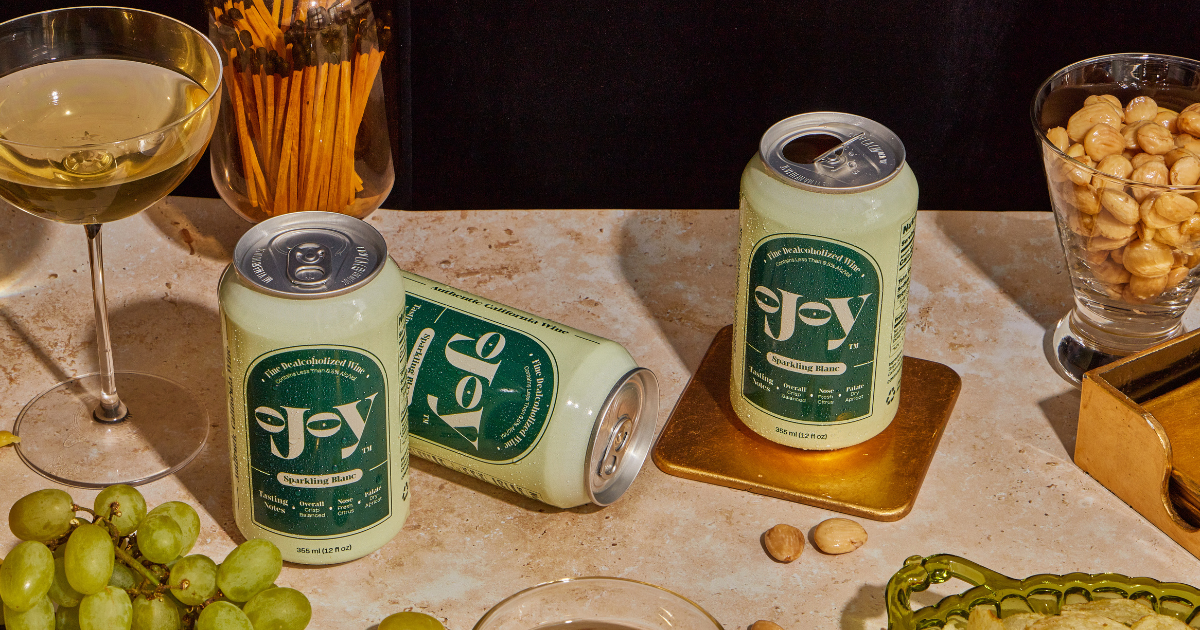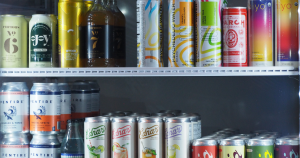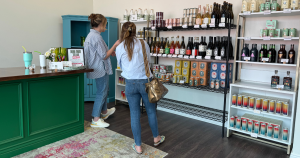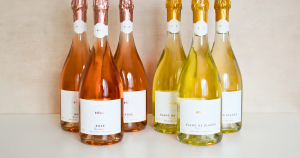OJOY Founder Marc Wendt had an epiphany during the pandemic and fell out of love with alcohol. But when he started exploring non-alcoholic wines, he couldn’t find one that matched his expectations. Leaning on his consumer packaged goods (CPG) expertise, Marc set out to address a gap he saw in the non-alc wine space. The result? 100% authentic California wine, gently dealcoholized with cutting-edge methods that maintain its flavor and complexity.
In this interview, Marc shares more about the journey of building his own brand, including salient thoughts on consumer behavior and the future of the non-alc space. Plus, he announces OJOY’s forthcoming launch: a Sparkling Rosé, just in time for warmer months.
You come from the CPG world, so it makes sense you were interested in building your own brand. What inspired you to launch a non-alcoholic wine, of all things?
I have to deconstruct it into three parts because we’re talking about wine, the non-alcoholic world, and brand building. It’s really about those three things together.
I first fell in love with wine when I was 19 years old. I was studying abroad in Spain, and I found myself at a dinner with strangers, local cuisine, and endless bottles of wine. As the night drew on—Spaniards are known for long meals—the conversation just kept going. I look back so fondly on that moment of complete bliss. People, conversation, great food, great wine. That really started my relationship with wine.
Then I fell out of love with alcohol mid-pandemic. That’s how I got into the non-alc world. I found myself slipping into unhealthy behaviors while isolating at home. A nightly drink turned into multiple drinks each night, my exercise routine had disappeared, and I had gained quite a few pounds. Like many people, I took an opportunity to step back, reflect, and evaluate my habits and behaviors. It was clear that my relationship with alcohol was no longer serving me in the same way it had before the pandemic. I decided to experiment by taking a break from alcohol for one year.
So, I fell in love with wine, then I fell out of love with alcohol. Then I explored what substitutes and alternatives were available on the market. I was happy to find great options for non-alc spirits and beers. However, with my love of wine, I kept searching for something that would meet my expectations. Unfortunately, I couldn’t find it. It was the perfect opportunity—a confluence of passion, skills, and an unmet market need. Who better to pursue it than myself? That was the inspiration behind what’s now OJOY Wine Company.
Love that confluence. You have experience at one of the largest CPG companies where you’ve helped build some powerhouse brands. What learnings are you now applying to your own brand?
I’ve learned a lot over the 10 years I’ve been building brands, which comes with a wealth of knowledge. I’ve been really fortunate.
One important learning is that people buy solutions, not brands. At the end of the day, people are just looking to make progress on a problem. Ultimately, a brand is a mental shortcut for them. It helps people get to that solution faster. It’s hurtful to hear as a brand marketer, but often people couldn’t care less about the brand.
Another learning is that brand loyalty is a myth. What we see in consumer behavior is people switching naturally from one brand to the next within the same category. That’s okay. It’s a natural movement in consumer behavior that we should expect. Chasing brand loyalty, I think, is a mistake. Instead, brands need to continually drive trial and awareness with users. Even if they’ve tried you before, every day is a new day, every day is a new launch.
Finally, I’ve learned that brilliant strategy is simple and brilliant execution is hard. It’s a little surprising, right? We like to think that the more complex our strategy, the more defensible it is. In reality, a great strategy is simple. The hard work comes in execution and sticking to your strategy—remaining loyal to the choices that you’ve made for your business. That’s hard. The context is always changing, and it’s really easy to get pulled off of your strategy and let your execution stray. That’s one of the most dangerous temptations as a brand owner.
You’re bringing a very measured and realistic approach to brand building. It’s not just: “I’ve built this great product, and now I’m going to get the word out.” For you, today seems to be just the beginning.
Exactly. As hard as it is to get a product to launch, the real work has just begun. It’s important to keep in mind that the customers don’t see any of that, nor should we expect them to care. They’re waiting for the execution, waiting in the market. They’ve got lives that they’re living, and we need to provide them with solutions that help them live more fulfilled lives. Execution is everything. It’s all the customer sees, and that’s when it really matters to make it count.
A solid lesson. Turning now to the product itself: could you tell us more about OJOY? You start with 100% authentic California wine and then dealcoholize it. How does that work? Why did you choose the dealcoholization route over a bottom-up formulation?
For me, it was important to have a true wine as opposed to a wine proxy. I believed the best way to get a new, high-quality non-alc wine on the market was to start with high-quality wine, then remove the alcohol as carefully as possible. We do this in a way that preserves all of the character and complexity of the wine.
I didn’t want to over-complicate things. In my experience, innovation doesn’t require reinventing the wheel. It can sometimes be enough to innovate on one vector with excellent execution, holding all the rest constant. In my case, I was innovating with a non-alcoholic variant. Plus a little bit on the packaging side. Innovate on the fact that it’s non-alcoholic, it’s in a can, it’s lower calorie. I decided early on, “that’s the vector I’ll innovate on.”
That’s a great idea. But how did you actually make it a reality?
I am a CPG guy. But I’ve never worked in beverages, and I was really quite blind to the world of wine. Then dealcoholization is just a completely different beast. I had a lot to learn. I cast a very wide net and evaluated a variety of partners. Ultimately, I ended up partnering with the folks who I thought had the best technologies to ultimately deliver what I wanted, which was high-quality wine without alcohol.
It involved a lot of cold calling, understanding what partners did, what was possible, meeting face-to-face, and flying out to California for development. We went through 44 iterations of our Sparkling Blanc until we finally landed on a blend that felt true to what I was trying to accomplish. It tasted like wine, smelled like wine, drank like wine. Yet it had less than 0.5% ABV. It was a lot of seeking to understand what’s possible and not settling for the first answer. That’s a bit of what went into it.
Taste is make-or-break in this category. It’s always been front and center for me: delivering excellent taste, what people expect from a wine. I like to think that we’ve done a pretty good job. We’ve been recognized at the San Francisco Chronicle Wine Competition, which is the largest competition of North American wines. We took home a silver medal in the non-alc category. That was a bit of validation. People who know what they’re talking about agree that Sparkling Blanc tastes great.
With some awards under your belt, what’s next for OJOY that you’re really excited about?
What I’m excited about right now is the non-alc movement and the community that comes with it. They’re honestly the most exciting things about my day-to-day. This is such an inspiring, motivating, and energizing space to be in. I’m fortunate to be a part of it.
In terms of what’s next for OJOY, summer is coming. That can only mean one thing: rosé season is coming!
I was hoping you would say that.
I’m excited to share that we’ll be launching a Sparkling Rosé in time for Memorial Day weekend, the kick-off of summer. It’ll be in a different packaging format, too: 750 ml standard wine bottles.
For those interested, you can sign up for pre-orders at drinkojoy.com/rose
That’s exciting! Zooming out and tying it back to where we started: you had a personal realization during the pandemic that made you fall out of love with alcohol. We see more and more people having similar realizations. As you think about the broader social drinking culture, what do you think the future is going to look like in five or 10 years?
If I had to choose one word to describe the future of social drinking, it would be: fluid.
First, “fluid” means that there’s a natural ebb and flow in people’s consumption habits, much in the same way as people flow from brand to brand. Their behaviors, the solutions they’re after will change from one season to the next. There’s more social awareness and tolerance now, more permission to explore and find what works for you within the non-alc world. There’s space to explore nuance. I see this greater acceptance of curiosity and willingness to explore that nuance among folks. It’s exciting to be a part of creating the conditions for that.
Second, “fluid” means non-static. Water will always seek its natural level, but that doesn’t mean that there won’t be raging waves or spills from time to time. That’s okay. Similarly, in the world of social drinking, there’s an acceptance of choosing to participate in different ways. People can seamlessly move from one choice to the next, always returning to what’s right for them to maintain balance. With greater acceptance, you don’t have to declare, “this is what I’m doing, and this is who I am for the rest of my life.”
It’s exciting to see, especially having gone through my own experience of living in the world of ordinary social drinking and then re-entering that world with alcohol alternatives. It’s a really exciting time. There have never been more choices available for people. I feel privileged to be part of that story for consumers.
OJOY is a fine dealcoholized California wine. It has 90% fewer calories than alcoholic wine and less than 0.5% ABV. You can shop their Sparkling Blanc and pre-order their Sparkling Rosé.
Dry Atlas is a media company focused on alcohol alternatives. We deliver non-alcoholic beverage news, insights, and recs to over five million people annually. To stay up to date on all things non-alc, subscribe to our weekly newsletter.







